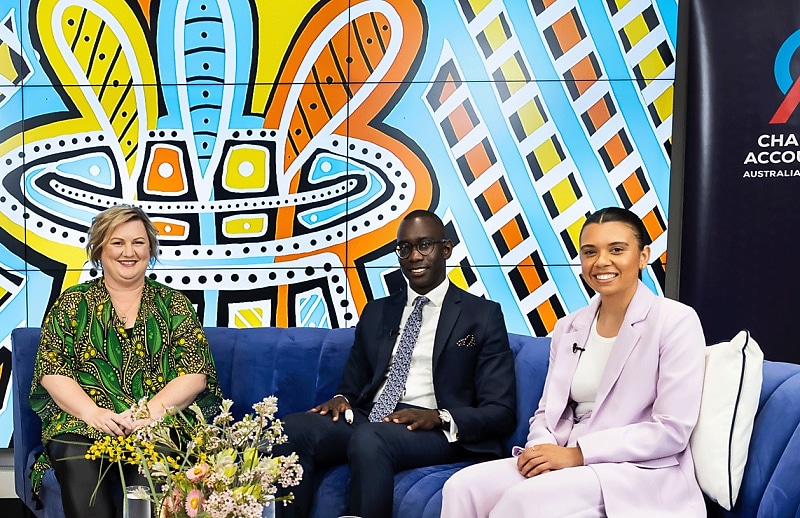You’re out of free articles for this month
Former High Court judge Kenneth Hayne said the Voice would “widen the field of participation” for Aboriginal and Torres Strait Islander people.
As a result, he said accountants would stand to benefit when the profession was drawn from a “broader cross-section of the community that can reflect the standards and insights of that broader community”.
“Accountants make a living out of giving advice,” he said, and the wider the field from which the profession recruited, the easier that task would be.
“The accounting profession wants to, it has to, maintain and enhance its reputation, and to do that, it must attract to the profession the best practitioners.”
Mr Hayne said there would be “no risks at all” to having a constitutionally enshrined advisory body.
“There is no hidden agenda, hidden meaning, time bomb sitting in the text, none of that.”
Instead, the Voice would ensure that Indigenous Australians’ perspectives would be considered in all policies. Listening to those in an entrenched position of disadvantage would likely lead to better outcomes, he said.
CA ANZ moderator Gillian Bowen said only 0.5 per cent of the body’s 80,000 members identified as Indigenous, despite making up nearly 4 per cent of the population.
In December, CA ANZ completed its first reconciliation action plan and subsequently endorsed the Uluru Statement from the Heart and the Voice after consultation with members and its Aboriginal and Torres Strait Islander member panel.
Ms Bowen acknowledged CA ANZ’s advocacy had been controversial with some members believing it was not relevant to the profession.
However, vice-president Tinashe Kamangira said the Voice would be an important opportunity to “lean in” to improving the body’s membership, which he was committed to diversifying.
“It would be a very bad thing for us not to listen to good advice. As a profession, talent is the biggest thing. We should be getting 10 times more Aboriginal and Torres Strait Islander members in the profession, and that’s something I’m committed to doing over the next couple of years,” he said.
Jagera woman Deanne Firth, who sat on the Aboriginal and Torres Strait Islander member panel, praised its work and said it echoed the Voice proposal.
“It’s kind of like the Voice but for chartered accountants,” she said.
“We provide guidance and advice about things that affect Indigenous accountants but also, it's about trying to increase the number of Indigenous accountants and be a support network … we can connect together, we can come up with strategies, we can use our networks to grow the Indigenous membership, which I think is fantastic.”
Ms Firth said the biggest problem facing Indigenous accountants was getting students to go to university and study accounting. She said accounting was comparatively less attractive than medicine or law degrees as their application to Indigenous issues was perceived as more tangible.
Kedeisha Kartinyeri, a Ngarrindjeri woman and founder of boutique firm KML Business Solutions, told the panel that it was “bizarre” and “isolating” to work in a field where there was so little representation.
“To be one of a few Aboriginal accountants is quite daunting, but I also feel really privileged to be in that 0.5 per cent,” she said. “You can’t be what you can’t see.”
The panellists commented on the growth of indigenous businesses and the benefits of having indigenous people as their accountants.
Ms Firth said it was “daunting” for Indigenous business owners to seek advice.
“It's a whole other world when you come into seeking an accountant and getting advice. It does break down barriers if they know you or know your community. The first thing they'll ask you is, ‘You know where your mob is?’ and suddenly you find out you’re fifth cousins or something like that! That really does help.”
Additionally, Indigenous accountants could help change old mindsets such as finance being only “whitefella business”.
“It’s actually important to being able to improve the community and get value for your money,” she said.
Ms Kartinyeri agreed: “For Aboriginal business owners to be introduced to an Aboriginal business, I feel like that breaks down a wall to start with. And then we're there really just being personal, making them feel comfortable, confident. And our number one goal in business is to mentor them, to be confident in their financials so that they can then make important informed decisions.”
Panellists proposed solutions for increasing Indigenous participation, including providing Indigenous mentors for newer members and more traineeships for students. They agreed attracting Indigenous students to the profession was a challenge, but emphasising the possibility to communities and the environment, through supporting sustainable businesses, could help make a career in accounting seem as purposeful as law or medicine.

 Login
Login







